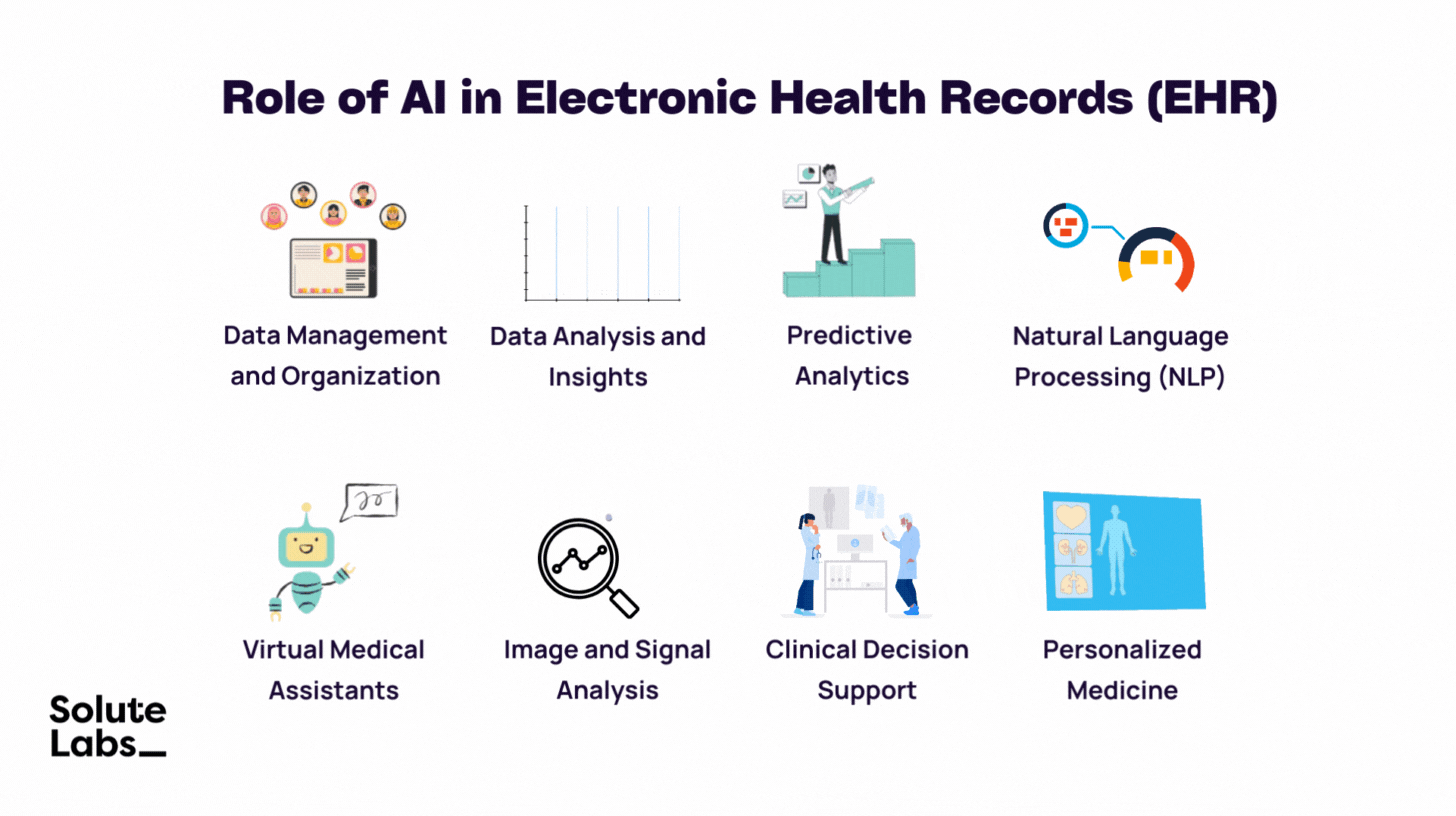Healthcare is not limited to just doctors and patients; it’s a world where the smallest decision can mean the difference between life and death to someone. Electronic Health Records (EHRs) have significantly transformed how medical information is stored and accessed compared to the traditional paper-based systems, but their evolution is far from over. It is continuously evolving rapidly with the AI integration.
In this blog, we will be looking at AI-driven EHRs and how AI is reshaping the healthcare landscape, enabling smarter patient management, personalized treatments, and predictive insights that can lead to better patient outcomes.
So, whether you are a healthcare professional, tech enthusiast, or just a curious mind with a lot of enthusiasm to know how AI will shape the future of the healthcare industry, this blog post is for you. The purpose of this post is to make you aware of how AI is revolutionizing the healthcare industry and how our expert software development is coming into play right at the onset of the transformation.
Overview of Electronic Health Records (EHRs)
EHR essentially refers to the digital forms of a patient's history, health-related information, and records of treatments. All such forms of records are electronically saved and handled for easy access to doctors concerned, treating physicians, and even for the patients themselves. A digitalized version of medical records means that a plethora of benefits is added to the health sector, replacing the traditional paper-based medical records.
EHRs usually contain large amounts of information relating to the patient, medical history, allergies, medications, laboratory results of tests, imaging reports, vaccination records, and demographic data. They make it much easier to create a full picture of the health aspects of a patient and, therefore, help health professionals make much more informed decisions about their care.
Among the intrinsic natures of EHRs is the fact that they can be shared and securely accessed by various healthcare providers across a wide range of clinical settings. This seamless data exchange is made possible through interoperability standards like FHIR and HL7, which enable better coordination and communication among multidisciplinary healthcare teams.
Role of AI in Electronic Health Records (EHR)
AI, no doubt, is going to revolutionize Electronic Health Records in the health sector, which will eventually bring new prospects to advance patient care, decision-making, and healthcare operations. AI belongs to the EHR software system, as the use of data coupled with sophisticated algorithms makes the basis of the following functions and benefits possible:

Data Management and Organization:
AI algorithms can classify and organize such data in such a manner that accessing relevant patient data and understanding it clearly is highly improved.
Data Analysis and Insights:
AI can analyze patient data from diverse sources, including patients' medical files, laboratory results, imaging reports, and in some cases even genetic data. Through a machine-learning algorithm, it finds patterns and trends, most of which may never be directly apparent to a human analyst. Such analysis of data could lead to early detection of diseases, better diagnoses, and personalized treatments, according to a person.
Predictive Analytics:
AI helps to predict the outcome of a patient and at a greater level of intensity picks out those patients vulnerable to given diseases. It is, therefore, possible that AI can allow proactive measures that could prevent unfavorable health events by analyzing their historical data/demographics and respective risk factors.
Natural Language Processing (NLP):
The same can also be attributed to the technological advancements that led to AI having the capability to read and process human language. When this NLP is applied to EHRs, the required data can be extracted, for it is constituted inside the free-text clinical notes and narrative reports, bringing a consolidated patient profile to be analyzed.
Virtual Medical Assistants:
AI-powered virtual assistants might be able to handle the routine administrative duties of healthcare providers. This includes managing appointment schedules, updating patient records, and answering simple patient queries, which would give more time for the medical professional to care for the patient.
Image and Signal Analysis:
AI is better placed to analyze medical images, such as X-rays and MRIs, alongside signals like ECGs, for the detection of anything anomalous in the results to aid in the diagnostic process. AI-based algorithms learn with large datasets of images to improve accuracy and increase speed in defining abnormalities.
Clinical Decision Support:
AI-powered EHRs will turn into a sort of assistant to the healthcare professional, which was very unimaginable earlier. It will alert and provide evidence-based recommendations for physicians. After analysis of patient data and medical literature, AI has the potential to point to probable diagnoses, and treatment alternatives, and even alert doctors for probable drug interactions or allergies, thus helping to make a very informed decision by the doctor.
Personalized Medicine:
AI can make personalized treatment plans based on the unique genetic makeup of the person, their case history, lifestyle, and response to prior treatments. This approach improves treatment efficacy and reduces risks associated with adverse reactions.
Despite its significant potential, integration of AI in EHRs holds a cluster of challenges, which include data privacy issues, the demand for proper AI algorithm validation, and the need for AI to be transparent and understandable for health care providers. However, with further advancement in the AI field and the confidence of healthcare providers that its prowess is actually being realized, AI will not just be a revolution but will lay the way for a much smoother and more effective automated healthcare system.
Suggested Read
10 Healthcare Business Ideas For Startups In 2023
View Blog
How to Overcome Challenges of AI Implementation for EHR
AI implementation in EHR within the healthcare environment does have its own set of hurdles. It helps to overcome these and gives a candid opportunity to blend AI technology for optimal benefits. Some solutions to tackle the AI implementation challenges for EHRs include:
Data Privacy and Security:
Patient data should always be kept in a way that protects its security. There needs to be, hence, observance of data protection regulations like the HIPAA in the U.S. and GDPR in the E.U. Integrate strong encryption and access controls to ensure the protection of sensitive information. This necessarily needs to be supported by regular security audits in finding vulnerabilities and patching them.
Data Quality and Standardization:
AI needs good quality data to provide the right insights from it. Adequate investment in data cleansing and normalization is, therefore, necessary to be able to ensure the uniformity and reliability of one's data. This would necessitate proper setting of standard formats for data with the relevant coding systems to improve the interoperability; hence data exchange between systems using diverse EHRs.
Algorithm Validation and Transparency:
Test and rigorously validate AI algorithms before implementation. Clinicians and other domain experts should be called upon to assess the accuracy, sensitivity, and specificity of algorithms. Make AI models interpretable and transparent, such that results are well understood and trusted by health providers.
Integration with Existing EHR Systems:
Computed integration of Artificial Intelligence into the earlier installed EHR infrastructure can prove extremely cumbersome. This can be facilitated by EHR and software developers cooperating to ensure smooth integration and interoperability. API supports efficient data exchange between AI applications and EHR systems for an easy integration process.
User Training and Acceptance:
Health institutions like hospitals should provide adequate training to health professionals and other staff on how to use AI tools effectively. Allay any fear of AI and emphasize possible benefits and impact on patient care to stimulate their acceptance and adoption.
Regulatory Compliance:
Stay informed of the changing regulatory landscape for AI use in healthcare applications. Work with the right level of legal and compliance professionals to help ensure AI is developed and operates within the wishes of legislature and regulation.
Ethical Considerations:
AI in healthcare has a lot of ethical concerns such as accountability for decisions made by AI and bias in algorithms. Create guidelines around the ethical use of AI, especially human oversight on key decisions.
Start Small and Scale:
Work with AI in small and pilot projects, testing the technology in an initiative with a limited, lab-like environment. Scale up as enterprises' trust in the AI's capabilities to achieve goals increases.
Continuous Monitoring and Improvement:
Always monitor the performance of AI systems, welcome the users' feedback with open hands, and at all costs, let AI algorithms constantly be improved based on feedback from real users, so there is accuracy and user experience.
Collaborate and Share Knowledge:
Engage other healthcare institutions, researchers, and AI experts in discussing their experiences, best practices, and lessons learned. Only when such collaborative efforts are taken on board will fast-tracking the AI adoption process initiate shared improvements in healthcare outcomes.
Suggested Read
Digital Transformation in Healthcare Industry - Why & How?
View Blog
How Much Does a Custom AI-Based EHR Cost?

A custom-built AI EHR will involve costs based on the complexity definition parameters of the AI algorithms and characteristics, healthcare organization size, customization scale, and integration with previously acquired EHRs.
This, therefore, involves AI-based EHR development, AI algorithms development, data integration into one unique system, user interface design, testing of the developed solution, and system support and maintenance procedures. Costs here also include licensing procedures for using AI technologies and observing healthcare regulation requirements.
The actual pricing for specific AI-based EHR projects can only be known by connecting with experienced software development agencies specialized in healthcare solutions. They can take note of specific requirements by different medical institutions and hence provide a project cost estimate, which suffices such needs.
Start with Expert Guidance for Your AI-powered EHR
As a leading software development agency specializing in healthcare solutions, SoluteLabs is at the forefront of this revolution. With our expertise in custom AI-based EHR development, we are committed to helping healthcare organizations harness the power of AI to optimize patient care and drive operational efficiency.
At SoluteLabs, we understand the unique needs of the healthcare industry and tailor AI solutions that align with your organizational goals. Our team of skilled developers, data scientists, and healthcare experts work collaboratively to create secure, scalable, and user-friendly AI-based EHRs that meet the highest standards of quality and compliance.
